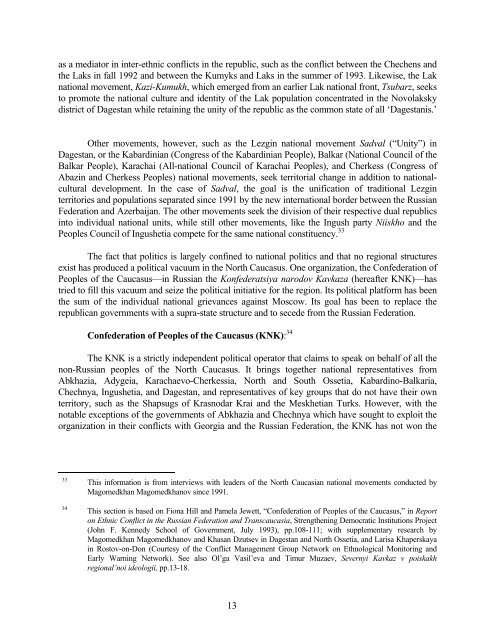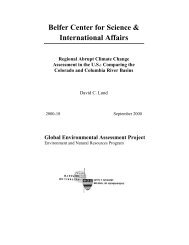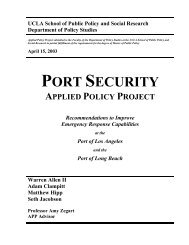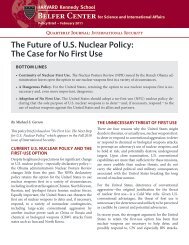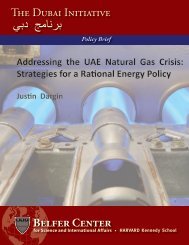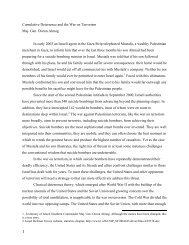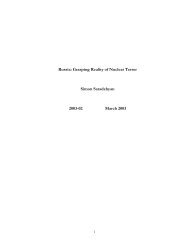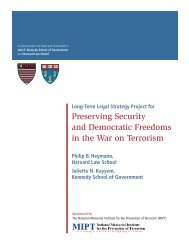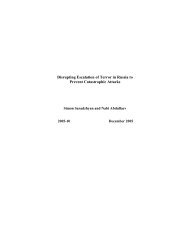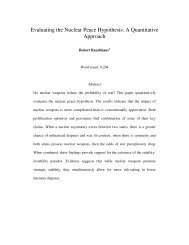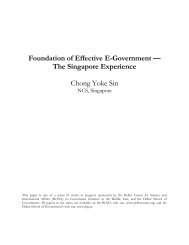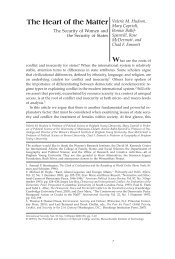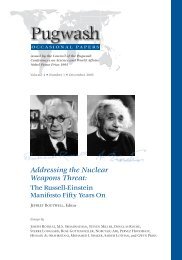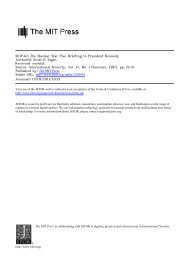RUSSIA'S TINDERBOX - Belfer Center for Science and International ...
RUSSIA'S TINDERBOX - Belfer Center for Science and International ...
RUSSIA'S TINDERBOX - Belfer Center for Science and International ...
Create successful ePaper yourself
Turn your PDF publications into a flip-book with our unique Google optimized e-Paper software.
as a mediator in inter-ethnic conflicts in the republic, such as the conflict between the Chechens <strong>and</strong><br />
the Laks in fall 1992 <strong>and</strong> between the Kumyks <strong>and</strong> Laks in the summer of 1993. Likewise, the Lak<br />
national movement, Kazi-Kumukh, which emerged from an earlier Lak national front, Tsubarz, seeks<br />
to promote the national culture <strong>and</strong> identity of the Lak population concentrated in the Novolaksky<br />
district of Dagestan while retaining the unity of the republic as the common state of all ‘Dagestanis.’<br />
Other movements, however, such as the Lezgin national movement Sadval (“Unity”) in<br />
Dagestan, or the Kabardinian (Congress of the Kabardinian People), Balkar (National Council of the<br />
Balkar People), Karachai (All-national Council of Karachai Peoples), <strong>and</strong> Cherkess (Congress of<br />
Abazin <strong>and</strong> Cherkess Peoples) national movements, seek territorial change in addition to nationalcultural<br />
development. In the case of Sadval, the goal is the unification of traditional Lezgin<br />
territories <strong>and</strong> populations separated since 1991 by the new international border between the Russian<br />
Federation <strong>and</strong> Azerbaijan. The other movements seek the division of their respective dual republics<br />
into individual national units, while still other movements, like the Ingush party Niiskho <strong>and</strong> the<br />
Peoples Council of Ingushetia compete <strong>for</strong> the same national constituency. 33<br />
The fact that politics is largely confined to national politics <strong>and</strong> that no regional structures<br />
exist has produced a political vacuum in the North Caucasus. One organization, the Confederation of<br />
Peoples of the Caucasus—in Russian the Konfederatsiya narodov Kavkaza (hereafter KNK)—has<br />
tried to fill this vacuum <strong>and</strong> seize the political initiative <strong>for</strong> the region. Its political plat<strong>for</strong>m has been<br />
the sum of the individual national grievances against Moscow. Its goal has been to replace the<br />
republican governments with a supra-state structure <strong>and</strong> to secede from the Russian Federation.<br />
Confederation of Peoples of the Caucasus (KNK): 34<br />
The KNK is a strictly independent political operator that claims to speak on behalf of all the<br />
non-Russian peoples of the North Caucasus. It brings together national representatives from<br />
Abkhazia, Adygeia, Karachaevo-Cherkessia, North <strong>and</strong> South Ossetia, Kabardino-Balkaria,<br />
Chechnya, Ingushetia, <strong>and</strong> Dagestan, <strong>and</strong> representatives of key groups that do not have their own<br />
territory, such as the Shapsugs of Krasnodar Krai <strong>and</strong> the Meskhetian Turks. However, with the<br />
notable exceptions of the governments of Abkhazia <strong>and</strong> Chechnya which have sought to exploit the<br />
organization in their conflicts with Georgia <strong>and</strong> the Russian Federation, the KNK has not won the<br />
33 This in<strong>for</strong>mation is from interviews with leaders of the North Caucasian national movements conducted by<br />
Magomedkhan Magomedkhanov since 1991.<br />
34 This section is based on Fiona Hill <strong>and</strong> Pamela Jewett, “Confederation of Peoples of the Caucasus,” in Report<br />
on Ethnic Conflict in the Russian Federation <strong>and</strong> Transcaucasia, Strengthening Democratic Institutions Project<br />
(John F. Kennedy School of Government, July 1993), pp.108-111; with supplementary research by<br />
Magomedkhan Magomedkhanov <strong>and</strong> Khasan Dzutsev in Dagestan <strong>and</strong> North Ossetia, <strong>and</strong> Larisa Khaperskaya<br />
in Rostov-on-Don (Courtesy of the Conflict Management Group Network on Ethnological Monitoring <strong>and</strong><br />
Early Warning Network). See also Ol’ga Vasil’eva <strong>and</strong> Timur Muzaev, Severnyi Kavkaz v poiskakh<br />
regional’noi ideologii, pp.13-18.<br />
13


